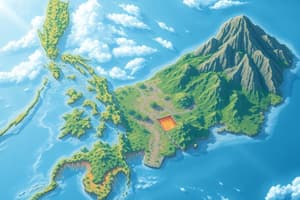Podcast
Questions and Answers
What does national territory encompass?
What does national territory encompass?
Which component of national territory is defined as waters adjacent to the land?
Which component of national territory is defined as waters adjacent to the land?
What principle protects a nation from external violations of its territory?
What principle protects a nation from external violations of its territory?
What can territorial disputes typically arise from?
What can territorial disputes typically arise from?
Signup and view all the answers
Why is international recognition of borders important?
Why is international recognition of borders important?
Signup and view all the answers
How does globalization impact traditional notions of territoriality?
How does globalization impact traditional notions of territoriality?
Signup and view all the answers
What does the legal framework governing national territory primarily include?
What does the legal framework governing national territory primarily include?
Signup and view all the answers
How is national territory associated with cultural identity?
How is national territory associated with cultural identity?
Signup and view all the answers
Study Notes
National Territory
-
Definition: A national territory refers to the area of land and waters that are under the jurisdiction of a sovereign state.
-
Components:
- Land Territory: The solid ground that forms the geographical area of a nation.
- Maritime Territory: Waters adjacent to the land, including territorial seas (up to 12 nautical miles from the baseline) and exclusive economic zones (up to 200 nautical miles).
- Airspace: The air above the land and waters, extending up to a certain altitude.
-
Sovereignty:
- Sovereignty implies the state's complete authority and control over its territory.
- Includes the right to govern, enforce laws, and regulate all activities within the territory.
-
Territorial Integrity:
- Refers to the principle that the national territory should not be violated or infringed upon by external forces.
- Protects against invasion, occupation, or annexation by other states.
-
Recognition of Territory:
- International recognition of a nation's borders is essential for diplomatic relations.
- Disputes over territory can lead to conflicts, negotiations, and treaties.
-
Territorial Disputes:
- Often arise due to historical claims, ethnic populations, or resource control.
- Examples include the South China Sea, Kashmir, and Crimea.
-
Legal Framework:
- Governed by international law, including treaties, customary law, and principles established by organizations like the United Nations.
-
Impact of Globalization:
- Increased interconnectedness may challenge traditional notions of territoriality.
- Issues such as immigration, trade, and technology transcend national borders.
-
Environmental Considerations:
- National territory includes the responsibility for environmental protection and sustainable resource management.
- Transboundary issues require international cooperation, especially concerning shared ecosystems and climate change.
-
Cultural and Historical Aspects:
- National territory often embodies cultural identity and historical significance.
- Territorial claims can be tied to ethnic, linguistic, or cultural groups.
National Territory Overview
- A national territory encompasses land and waters under the jurisdiction of a sovereign state.
Components of National Territory
- Land Territory: Represents the physical geographical area of a nation.
- Maritime Territory: Includes adjacent waters, characterized by:
- Territorial seas up to 12 nautical miles from the baseline.
- Exclusive Economic Zones (EEZ) extending up to 200 nautical miles.
- Airspace: Encompasses the air above the land and waters, with defined altitude limits.
Sovereignty
- Complete authority and control of a state over its territory.
- Grants the right to govern, enforce laws, and regulate activities.
Territorial Integrity
- Principle asserting that national boundaries should be respected, protecting against external invasions or annexations.
Recognition of Territory
- International acknowledgment of a nation's borders is vital for diplomatic relations.
- Territorial disputes may escalate into conflicts, negotiations, or treaties.
Territorial Disputes
- Often rooted in historical claims, ethnic populations, or resource control.
- Notable examples include conflicts in the South China Sea, Kashmir, and Crimea.
Legal Framework
- Territory is governed by international law, including:
- Treaties
- Customary law
- Principles established by organizations like the United Nations.
Impact of Globalization
- Increased interconnectedness challenges traditional concepts of territoriality.
- Issues such as immigration, trade, and technology often transcend national borders.
Environmental Considerations
- National territories include the duty for environmental protection and sustainable resource management.
- Transboundary environmental issues necessitate international cooperation to address shared ecosystems and climate challenges.
Cultural and Historical Aspects
- National territory reflects cultural identity and holds historical significance.
- Territorial claims often intertwine with ethnic, linguistic, or cultural affiliations.
Studying That Suits You
Use AI to generate personalized quizzes and flashcards to suit your learning preferences.
Description
Explore the essential concepts of national territory, including its components such as land territory, maritime territory, and airspace. Understand the importance of sovereignty and territorial integrity in maintaining a sovereign state's authority. This quiz covers key principles that define a nation's jurisdiction and control over its territory.




